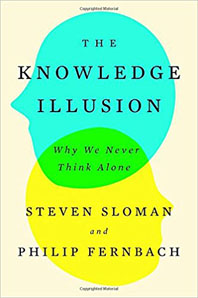We Never Think Alone: The Distribution of Human Knowledge
Only a small portion of the knowledge that humans have acquired resides in your head. Even the brightest of us is mostly ignorant. Despite this fact, we all suffer from the illusion that we know more than we actually do. We suffer from the “knowledge illusion,” in part, because we fail to draw accurate boundaries between the knowledge that we carry in our own heads and the knowledge that resides in the world around us and the minds of others. A wonderful new book by two cognitive scientists, Steven Sloman and Philip Fernback, titled The Knowledge Illusion: Why We Never Think Alone, describes the distributed nature of human knowledge and suggests how we can make better use of it.
The following four excerpts from the book provide a sense of the authors’ argument:
The human mind is both genius and pathetic, brilliant and idiotic. People are capable of the most remarkable feats, achievements that defy the gods…And yet we are equally capable of the most remarkable demonstrations of hubris and foolhardiness. Each of us is error-prone, sometimes irrational, and often ignorant…And yet human society works amazingly well…
The secret of our success is that we live in a world in which knowledge is all around us. It is in the things we make, in our bodies and workspaces, and in other people. We live in a community of knowledge.
The human mind is not like a desktop computer, designed to hold reams of information. The mind is a flexible problem solver that evolved to extract only the most useful information to guide decisions in new situations. As a consequence, individuals store very little detailed information about the world in their heads. In that sense, people are like bees and society a beehive: Our intelligence resides not in individual brains but in the collective mind.
Being smart is about having the ability to extract deeper, more abstract information from the flood of data that comes into our senses…The mind is busy trying to choose actions by picking out the most useful stuff and leaving the rest behind. Remembering everything gets in the way of focusing on the deeper principles that allow us to recognize how a new situation resembles past situations and what kinds of actions will be effective.
In a world with rapidly increasing stores of information, it is critical that we learn how to find the best information (the signals) among the mounds of meaningless, erroneous, or irrelevant information (the noise) that surrounds us. Individually, we can only be experts in a few domains, so we must identify and rely on the best expertise in other domains. We don’t benefit from more knowledge; we benefit from valid and useful knowledge. One of the great challenges of our time is to find ways to identify, bring together, and encourage the best of what we know.
The power of crowdsourcing and the promise of collaborative platforms suggest that the place to look for real superintelligence is not in a futuristic machine that can outsmart human beings. The superintelligence that is changing the world is the community of knowledge. The great advances in technology aren’t to be found in creating machines with superhuman horsepower; instead, they’ll come from helping information flow smoothly through ever-bigger communities of knowledge and by making collaboration easier. Intelligent technology is not replacing people so much as connecting them.
This book is well written and accessible. It provided me with many valuable insights. I’m confident that it will do the same for you.
Take care,


